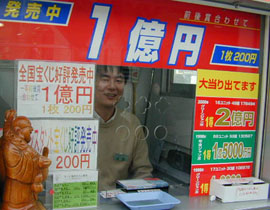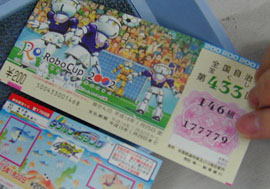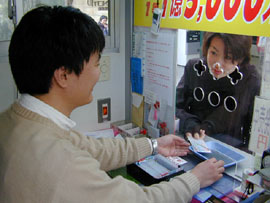Life in a Box: Selling Japan's Lottery
As is my daily morning ritual after arriving at the office in the newsroom, I started on the first box on the left with my lucky one-yen coin. All I had to do was reveal a cartoon fish beneath the crusted layer of silver and blue. With the card pinned to my desk with my left hand, I quickly ran the edge of the coin over the "scratch" area with my right. Then I heard a voice.
"Instead of wasting your money chasing riches with lottery tickets, why don't you just stop boozing every night?"
I didn't look up. I knew it was junior reporter Junko.
 For him, the winters are too cold and the summers too hot. On any day, he can present great riches to any one of his customers. But more often, he gives them encouragement and even psychological counseling to ease their financial woes. Though his business is a form of gambling, the yakuza (organized crime) leave him alone. However, back pain from sitting all day, provides him with more than his share of trouble. Such is life working in a box not much bigger than three refrigerators selling lottery tickets to a populace in the throws of recession.
For him, the winters are too cold and the summers too hot. On any day, he can present great riches to any one of his customers. But more often, he gives them encouragement and even psychological counseling to ease their financial woes. Though his business is a form of gambling, the yakuza (organized crime) leave him alone. However, back pain from sitting all day, provides him with more than his share of trouble. Such is life working in a box not much bigger than three refrigerators selling lottery tickets to a populace in the throws of recession.
"I don't have the money and I can't afford it. But I really want to win!" was a phrase that Akio Orii, 30, repeatedly heard during the most recent December yearend Jumbo lottery. His shop, at the top of subway exit #9 on the east side of Shibuya Station, is one of over 10,000 operations across Japan licensed to sell takarakuji, or lottery, tickets. He says that a feeling of desperation could be felt gathering around his shop each day at that time, more than at any other time during the four years that he has manned the operation.
Sales of modern day lottery tickets began just after World War II as one of the means of funding Japan's reconstruction. Even though Japan's economy is in a 10-year tailspin, lottery ticket sales have steadily increased. Sales for fiscal year 2000 set an all time record and came in at over ¥1 trillion. This increase has been due to continual boosts in the lottery payouts and the obliteration of the policy that limited the number of tickets sold.
Of course, the customers' expectations of winning have risen as well. This, along with the low probability of actually garnering any of the significant prizes offered in any of the Scratch, Jumbo, or Numbers games, can make for an interesting mix of anxiety and desire for the latest luck bringing strategy on the part of the players.
The most common form of play is Numbers. Players simply select either a three- or four-digit number combination. Payoffs are determined on the ticket price and whether a particular order was selected or merely a combination of the drawn numbers. Additionally, at various times of the year there are three special Jumbo lotteries. These are the most popular as payouts can reach ¥200 million or more.
Over the years, Tokyo's Yurakucho and Ginza areas have been reputed to be lucky areas for the purchase of lottery tickets. During some of the big Jumbo sales periods, the media swarms down to these areas to cover the action. A light player himself, Akio scoffs at such nonsense. He's had a customer win ¥200 million at his shop.
 Even though the Shibuya area is famous for forging teen fashion trends, the salaryman has been Akio's bread and butter. But sales to young women have been rising recently. It is also this demographic that is making for his most interesting customer, he says.
Even though the Shibuya area is famous for forging teen fashion trends, the salaryman has been Akio's bread and butter. But sales to young women have been rising recently. It is also this demographic that is making for his most interesting customer, he says.
"One of my regulars is a follower of fusui (a philosophy that orients one's life with nature). She always brings a yellow handkerchief to the shop with her. After purchasing her Numbers ticket she carefully folds it inside and takes it home."
Outside the window of Akio's shop sits a small brown wood statue of Ebisu, the deity of prosperity. Akio says that such symbols of luck are important to the Japanese buyer.
"On taian days we have an increase in sales of 50%," Akio says of the days designated on the Japanese calendar as being known for being the luckiest. Of course, the reverse is true for days designated for bringing the worst luck, or butsumetsu. On such days, sales fall 20%.
Akio's only responsibility is selling the tickets. He is just a mere piece of the lottery machine that is run by Dai-Ichi Kangyo Bank. The bank is responsible for advertising, printing tickets, public relations, and payment of the prizes. For his efforts, Akio gets a percentage of the ticket price. Through these sales, he has managed to buy a home in upscale Meguro Ward of Tokyo.
Getting in on this gravy isn't easy, Akio cautions. In Shibuya there are 16 shops and the bank designates the location of each. It is very competitive. His mother was working in the business 15 years ago and through various strong connections, she managed to get the Shibuya shop.
It is not all happiness though. In addition to back discomfort from the constant sitting, Akio realizes that most of his customers are going to lose. And with a new lottery starting each week, he has many regulars that lost the previous week looking to try their luck with the new game this week.
 In some instances, Akio might offer hope and motivation to keep their hopes up, "If you haven't gotten a winning ticket recently, then well..." It is all he can do. But the mere hint of optimism on Akio's part will sometimes be enough to send the customer off smiling.
In some instances, Akio might offer hope and motivation to keep their hopes up, "If you haven't gotten a winning ticket recently, then well..." It is all he can do. But the mere hint of optimism on Akio's part will sometimes be enough to send the customer off smiling.
For those without a yellow handkerchief, a smile will do just fine. That is, until next week's game.
I continued working on the card, my balding crown perpendicular to Junko's vector of interrogation.
Then she said, "It only makes sense that you'd quit when you factor in all your alcohol costs, hostess fees, taxi fares..."
I looked upward and stared directly at her, employing my one standby means of getting the upper hand. In the same manner that it takes time for a sailor to get his "legs" in choppy seas, Junko takes a few moments each morning to collect herself after seeing my combination - affectionately referred to as my "double barrel" - of bloodshot eyes and sagging bags. Today was no exception and it gave me the opportunity I needed:
"I'll have you know little lady that if I stopped those activities the drops in domestic demand across the board would cause Japan's quarterly GDP to fall by a full one-tenth of one percent."
She slowly dropped her head to the floor in acknowledgement, no doubt mentally ticking off the individual components that make up the GDP computation for each degree of head turn.
"Now, with rising unemployment and falling consumer demand as they are," I rose up to the edge of my chair even though she wasn't looking at me, "would you want any further economic erosion on your hands?"
She slowly shook her head back and forth like a child being scolded by her mother for wanting to eat ice cream before dinner.
I may not have seen a fish on the card but I was a winner. Of that I am sure.
Note: Nobuko Chuma contributed to this report.

